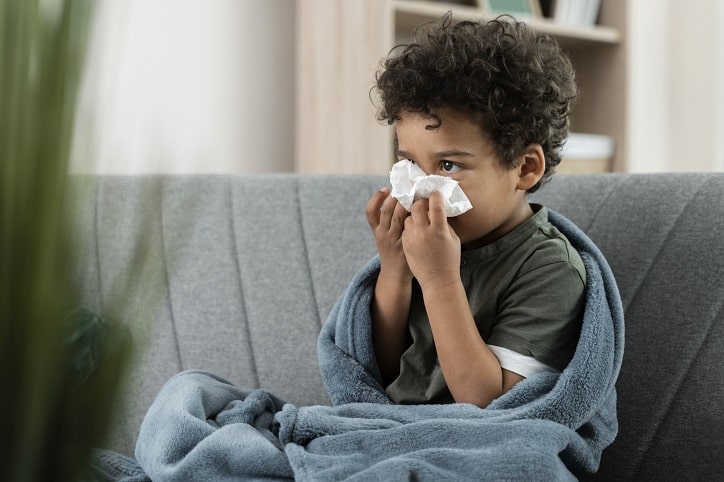Few things startle parents like seeing blood coming from their child’s nose—especially if it happens suddenly. While nosebleeds can look scary, they’re surprisingly common in children and are usually not serious.
At Focus on Kids Pediatrics in Littleton, CO, we frequently hear from concerned parents wondering why nosebleeds happen and what they should do in the moment. The good news? Most nosebleeds in kids can be managed easily at home, and understanding the cause can help you prevent future episodes.
In this guide, we’ll explain the top causes of nosebleeds in children, how to stop them quickly, and when to call your pediatrician.

What Causes Nosebleeds in Children?
Children’s nasal passages are sensitive, and a variety of everyday factors can trigger bleeding. The most common causes include:
1. Dry Air or Low Humidity
In Colorado’s dry climate—especially during winter or with indoor heating—the inside of the nose can become dry and irritated, making blood vessels more likely to break.
2. Nose Picking or Rubbing
This is one of the most frequent reasons kids get nosebleeds. Even a tiny scratch to the inside of the nose can cause bleeding, especially if the skin is already dry or irritated.
3. Allergies or Colds
Frequent blowing or wiping due to a runny or stuffy nose can inflame and damage nasal tissue. Conditions like Seasonal Allergies in Children or Respiratory Infections in Children can increase the risk.
4. Injuries or Trauma
A fall, bump, or rough play can lead to a nosebleed—even if there’s no visible injury. In some cases, nosebleeds may be a symptom of more significant trauma, so it’s important to monitor for other signs like facial swelling or a persistent headache.
5. Underlying Medical Conditions
While uncommon, frequent or severe nosebleeds can sometimes be linked to clotting disorders or other health conditions. If your child has other symptoms—like easy bruising or bleeding gums—your pediatrician may recommend further testing.
How to Stop a Nosebleed Quickly
If your child has a nosebleed, stay calm. Most cases can be stopped at home with these simple steps:
1. Have your child sit up and lean slightly forward.
This prevents blood from going down the throat, which can cause coughing or nausea.
2. Pinch the soft part of the nose.
Use your thumb and forefinger to gently pinch both nostrils shut, just below the bony bridge. Hold for 10 minutes without letting go.
3. Use a cool compress on the bridge of the nose.
Applying a cold washcloth or ice pack can help constrict blood vessels and slow the bleeding.
4. Avoid nose blowing or strenuous activity for a few hours.
This gives the area time to heal and helps prevent re-bleeding.
5. Don’t tilt the head back or pack the nose.
These common myths can actually worsen the situation or lead to blood being swallowed.
If bleeding doesn’t stop after 15–20 minutes, or if the nosebleed returns multiple times in a day, call your pediatrician.
How to Prevent Future Nosebleeds
While you can’t stop every nosebleed from happening, these tips can help reduce how often they occur:
- Use a cool-mist humidifier in your child’s bedroom, especially during dry months
- Apply a small dab of petroleum jelly inside the nostrils before bed to keep tissues moist
- Teach gentle nose-blowing techniques to avoid irritation
- Trim fingernails and remind kids not to pick their nose
- Manage seasonal allergies with help from your pediatrician
You can also support your child’s overall health by boosting hydration, using a saline nasal spray if recommended, and following a balanced diet for kids that supports tissue healing and immune function.
When to See a Pediatrician
Call your provider if:
- Nosebleeds are frequent or unexplained
- Bleeding lasts more than 20 minutes despite pressure
- There are signs of other bleeding issues (like easy bruising or bleeding gums)Your child experiences a nosebleed after a head injury
Occasional nosebleeds are often normal, especially in dry climates. But if you’re concerned or unsure what’s causing them, we’re here to help.
Final Thoughts
While nosebleeds can be messy and alarming, they’re usually harmless—and manageable with the right know-how. Understanding the causes and how to respond quickly can make a big difference in your child’s comfort (and your peace of mind).
At Focus on Kids Pediatrics, we’re here to support every aspect of your child’s health—from routine concerns like nosebleeds to more complex conditions. If you ever have questions or need help managing frequent nosebleeds, don’t hesitate to reach out.
Visit or call us today to schedule an appointment. Our experienced pediatricians are proud to serve families throughout Littleton, CO with experienced, compassionate care.